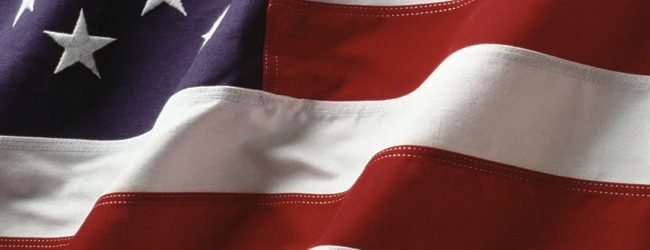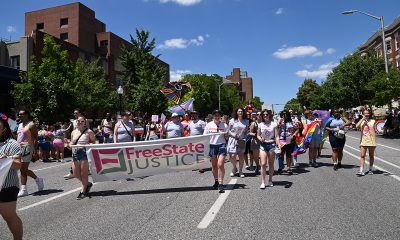National
Court orders injunction against ‘Don’t Ask’ enforcement
Justice Dept. has 60 days to appeal decision

A California federal court on Tuesday granted an injunction against the enforcement of “Don’t Ask, Don’t Tell” throughout the United States and across the globe.
U.S. District Judge Virginia Phillips confirmed her earlier opinion in September against “Don’t Ask, Don’t Tell” in the case of Log Cabin v. United States by granting an immediate and permanent injunction barring the U.S. government from enforcing the law. Additionally, the court ordered the suspension of all pending proceedings and investigations under “Don’t Ask, Don’t Tell.”
In her injunction, Phillips reiterates that “Don’t Ask, Don’t Tell” violates the free speech and due process rights of gay, lesbian and bisexual service members under the First and Fifth Amendments. Phillips says her injunction “permanently enjoins” the U.S. government “from enforcing or applying the ‘Don’t Ask, Don’t Tell’ Act and implementing regulations, against any person under their jurisdiction or command.”
The Justice Department has 60 days to determine whether or not to appeal the decision to the U.S. Ninth Circuit Court of Appeals. Tracy Schmaler, a Justice Department spokesperson, said the U.S. government is reviewing the ruling.
President Obama has pledged to end “Don’t Ask, Don’t Tell.” Many opponents of the law, including members of Congress, have urged the president not to appeal the court decision.
During a press conference Tuesday, White House Press Secretary Robert Gibbs deferred comment on the injunction to the Justice Department.
“Obviously there have been a number of court cases that have ruled in favor of plaintiffs in this case,” Gibbs added. “And the President will continue to work as hard as he can to change the law that he believes is fundamentally unfair.”
Christian Berle, acting executive director for the National Log Cabin Republicans, which filed the lawsuit in 2004, said the court’s decision is the only “reasonable solution” in how to handle “Don’t Ask, Don’t Tell” in the wake of the ruling finding the law violated service members’ constitutional rights.
“These soldiers, sailors, airmen and Marines sacrifice so much in defense of our nation and our Constitution,” he said. “It is imperative that their constitutional freedoms be protected as well.”
Berle added the injunction strengthens national defense because the U.S. government is no longer compelled to “discharge service members with valuable skills and experience because of an archaic policy mandating irrational discrimination.”
Francine Minadeo, a spokesperson for White & Case LLP, which represented Log Cabin in the case, said the order has no stay of injunction and the firm doesn’t know whether the government will appeal the decision.
Aaron Tax, legal director for the Servicemembers Legal Defense Network, said his also organization applauds the ruling, but warned gay, lesbian and bisexual service members in the U.S. military against making their sexual orientation public in the wake of the Phillips’ order.
“This order will likely be appealed by the Justice Department and brought to the U.S. Court of Appeals for the Ninth Circuit where her decision may well be reversed,” Tax said. “Service members must proceed safely and should not come out at this time.”
Greg Rinckey, an attorney with Tully-Rinckey, which handles “Don’t Ask, Don’t Tell” cases, also said LGBT service members remain “in danger” if they decide to come out.
“I envision there will be an appeal filed [Tuesday or Wednesday] requesting an injunction for a stay on it, so it’s definitely not safe to come out now,” Rinckey said.
Alexander Nicholson, executive director of Servicemembers United and sole named veteran plaintiff in the lawsuit, called the order “another historic and courageous step in the right direction.”
“While this is certainly news to be celebrated, we would also advise caution in advance of a potential stay from the Ninth Circuit,” he said. “If the appellate court wishes to put itself on the right side of history, however, it will allow this sound and long-over due decision to remain in effect.”
U.S. Supreme Court
Supreme Court to consider bans on trans athletes in school sports
27 states have passed laws limiting participation in athletics programs

The U.S. Supreme Court on Thursday agreed to hear two cases involving transgender youth challenging bans prohibiting them from participating in school sports.
In Little v. Hecox, plaintiffs represented by the ACLU, Legal Voice, and the law firm Cooley are challenging Idaho’s 2020 ban, which requires sex testing to adjudicate questions of an athlete’s eligibility.
The 9th U.S. Circuit Court of Appeals described the process in a 2023 decision halting the policy’s enforcement pending an outcome in the litigation. The “sex dispute verification process, whereby any individual can ‘dispute’ the sex of any female student athlete in the state of Idaho,” the court wrote, would “require her to undergo intrusive medical procedures to verify her sex, including gynecological exams.”
In West Virginia v. B.P.J., Lambda Legal, the ACLU, the ACLU of West Virginia, and Cooley are representing a trans middle school student challenging the Mountain State’s 2021 ban on trans athletes.
The plaintiff was participating in cross country when the law was passed, taking puberty blockers that would have significantly reduced the chances that she could have a physiological advantage over cisgender peers.
“Like any other educational program, school athletic programs should be accessible for everyone regardless of their sex or transgender status,” said Joshua Block, senior counsel for the ACLU’s LGBTQ and HIV Project. “Trans kids play sports for the same reasons their peers do — to learn perseverance, dedication, teamwork, and to simply have fun with their friends,” Block said.
He added, “Categorically excluding kids from school sports just because they are transgender will only make our schools less safe and more hurtful places for all youth. We believe the lower courts were right to block these discriminatory laws, and we will continue to defend the freedom of all kids to play.”
“Our client just wants to play sports with her friends and peers,” said Lambda Legal Senior Counsel Tara Borelli. “Everyone understands the value of participating in team athletics, for fitness, leadership, socialization, and myriad other benefits.”
Borelli continued, “The U.S. Court of Appeals for the Fourth Circuit last April issued a thoughtful and thorough ruling allowing B.P.J. to continue participating in track events. That well-reasoned decision should stand the test of time, and we stand ready to defend it.”
Shortly after taking control of both legislative chambers, Republican members of Congress tried — unsuccessfully — to pass a national ban like those now enforced in 27 states since 2020.
Federal Government
UPenn erases Lia Thomas’s records as part of settlement with White House
University agreed to ban trans women from women’s sports teams

In a settlement with the Trump-Vance administration announced on Tuesday, the University of Pennsylvania will ban transgender athletes from competing and erase swimming records set by transgender former student Lia Thomas.
The U.S. Department of Education’s Office for Civil Rights found the university in violation of Title IX, the federal rights law barring sex based discrimination in educational institutions, by “permitting males to compete in women’s intercollegiate athletics and to occupy women-only intimate facilities.”
The statement issued by University of Pennsylvania President J. Larry Jameson highlighted how the law’s interpretation was changed substantially under President Donald Trump’s second term.
“The Department of Education OCR investigated the participation of one transgender athlete on the women’s swimming team three years ago, during the 2021-2022 swim season,” he wrote. “At that time, Penn was in compliance with NCAA eligibility rules and Title IX as then interpreted.”
Jameson continued, “Penn has always followed — and continues to follow — Title IX and the applicable policy of the NCAA regarding transgender athletes. NCAA eligibility rules changed in February 2025 with Executive Orders 14168 and 14201 and Penn will continue to adhere to these new rules.”
Writing that “we acknowledge that some student-athletes were disadvantaged by these rules” in place while Thomas was allowed to compete, the university president added, “We recognize this and will apologize to those who experienced a competitive disadvantage or experienced anxiety because of the policies in effect at the time.”
“Today’s resolution agreement with UPenn is yet another example of the Trump effect in action,” Education Secretary Linda McMahon said in a statement. “Thanks to the leadership of President Trump, UPenn has agreed both to apologize for its past Title IX violations and to ensure that women’s sports are protected at the university for future generations of female athletes.”
Under former President Joe Biden, the department’s Office of Civil Rights sought to protect against anti-LGBTQ discrimination in education, bringing investigations and enforcement actions in cases where school officials might, for example, require trans students to use restrooms and facilities consistent with their birth sex or fail to respond to peer harassment over their gender identity.
Much of the legal reasoning behind the Biden-Harris administration’s positions extended from the 2020 U.S. Supreme Court case Bostock v. Clayton County, which found that sex-based discrimination includes that which is based on sexual orientation or gender identity under Title VII rules covering employment practices.
The Trump-Vance administration last week put the state of California on notice that its trans athlete policies were, or once were, in violation of Title IX, which comes amid the ongoing battle with Maine over the same issue.
New York
Two teens shot steps from Stonewall Inn after NYC Pride parade
One of the victims remains in critical condition

On Sunday night, following the annual NYC Pride March, two girls were shot in Sheridan Square, feet away from the historic Stonewall Inn.
According to an NYPD report, the two girls, aged 16 and 17, were shot around 10:15 p.m. as Pride festivities began to wind down. The 16-year-old was struck in the head and, according to police sources, is said to be in critical condition, while the 17-year-old was said to be in stable condition.
The Washington Blade confirmed with the NYPD the details from the police reports and learned no arrests had been made as of noon Monday.
The shooting took place in the Greenwich Village neighborhood of Manhattan, mere feet away from the most famous gay bar in the city — if not the world — the Stonewall Inn. Earlier that day, hundreds of thousands of people marched down Christopher Street to celebrate 55 years of LGBTQ people standing up for their rights.
In June 1969, after police raided the Stonewall Inn, members of the LGBTQ community pushed back, sparking what became known as the Stonewall riots. Over the course of two days, LGBTQ New Yorkers protested the discriminatory policing of queer spaces across the city and mobilized to speak out — and throw bottles if need be — at officers attempting to suppress their existence.
The following year, LGBTQ people returned to the Stonewall Inn and marched through the same streets where queer New Yorkers had been arrested, marking the first “Gay Pride March” in history and declaring that LGBTQ people were not going anywhere.
New York State Assemblywoman Deborah Glick, whose district includes Greenwich Village, took to social media to comment on the shooting.
“After decades of peaceful Pride celebrations — this year gun fire and two people shot near the Stonewall Inn is a reminder that gun violence is everywhere,” the lesbian lawmaker said on X. “Guns are a problem despite the NRA BS.”
-

 U.S. Supreme Court2 days ago
U.S. Supreme Court2 days agoSupreme Court to consider bans on trans athletes in school sports
-

 Out & About2 days ago
Out & About2 days agoCelebrate the Fourth of July the gay way!
-

 Virginia2 days ago
Virginia2 days agoVa. court allows conversion therapy despite law banning it
-

 New York5 days ago
New York5 days agoTwo teens shot steps from Stonewall Inn after NYC Pride parade












